The 20 Most Influential Christian Scholars
Super Scholar’s 20 most influential Christian scholars have profoundly influenced the world by advancing Christian belief, by reconceptualizing it, or even by fundamentally challenging it. In any case, each of the thinkers below has deeply impacted Western culture’s self-understanding.
1. Francisco Ayala
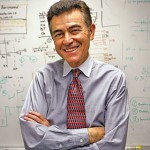 Francisco
Ayala (b. 1934), an evolutionary biologist and geneticist at the
University of California, Irvine, is well known as both a Catholic
cleric and defender of Darwinian evolution. He has derided the idea that
the universe or life show evidence of intelligent design. He urges lay
people to embrace Darwinism and has called design “blasphemous.” Despite
ongoing controversies over Darwinism, especially in the United States,
he commented on 2009’s bicentennial celebrations of Darwin as follows:
“Charles Darwin would be ecstatic, overcome with joy and fulfillment. At
age 200, he would be celebrating the greatest and happiest birthday of
his life.” Ayala has received many honors for his work, including the
Templeton Prize for Progress in Religion and the National Medal of
Science.
Francisco
Ayala (b. 1934), an evolutionary biologist and geneticist at the
University of California, Irvine, is well known as both a Catholic
cleric and defender of Darwinian evolution. He has derided the idea that
the universe or life show evidence of intelligent design. He urges lay
people to embrace Darwinism and has called design “blasphemous.” Despite
ongoing controversies over Darwinism, especially in the United States,
he commented on 2009’s bicentennial celebrations of Darwin as follows:
“Charles Darwin would be ecstatic, overcome with joy and fulfillment. At
age 200, he would be celebrating the greatest and happiest birthday of
his life.” Ayala has received many honors for his work, including the
Templeton Prize for Progress in Religion and the National Medal of
Science.
Reference Links:
- Faculty bio
- Interviews
2. Benedict XVI (Joseph Ratzinger)
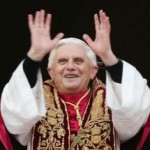 Joseph
Ratzinger (b. 1927) was elected Pope Benedict XVI. As Prefect of the
Congregation for the Doctrine of the Faith before his election, he was
responsible for maintaining the integrity of Roman Catholic doctrine. To
this end, he organized a re-edit of the Catechism of the Catholic
Church. He has been noted for prayer cards, widely distributed in Rome
in many languages, saying that we are not exclusively a product of
evolution. Not shy of controversy, he claimed, in his Regensburg
Address, that Islam has a tendency to descend into violence. Though much
derided for this address, he claimed it is firmly anchored in the
Catholic teaching on natural justice.
Joseph
Ratzinger (b. 1927) was elected Pope Benedict XVI. As Prefect of the
Congregation for the Doctrine of the Faith before his election, he was
responsible for maintaining the integrity of Roman Catholic doctrine. To
this end, he organized a re-edit of the Catechism of the Catholic
Church. He has been noted for prayer cards, widely distributed in Rome
in many languages, saying that we are not exclusively a product of
evolution. Not shy of controversy, he claimed, in his Regensburg
Address, that Islam has a tendency to descend into violence. Though much
derided for this address, he claimed it is firmly anchored in the
Catholic teaching on natural justice.
Reference Links:
- Speach
- Interviews
3. Peter Berger
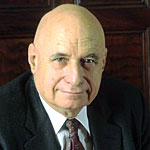 Peter
L. Berger (b. 1929) is a sociologist, who, starting in 1985, was
director of the Institute for the Study of Economic Culture based at
Boston University. He is best known for his sympathetic treatment of
traditional religious beliefs that have guided humanity for thousands of
years. Accounting for a worldwide resurgence of religion, he noted that
there is an intractable conflict between the certainties by which
people have lived for thousands of years and the secularity of an elite
culture advancing rapidly to power in the Western world. His best known
work is in social constructionism, a school of thought that focuses on
uncovering the ways in which individuals and groups participate in the
creation of their perceived reality.
Peter
L. Berger (b. 1929) is a sociologist, who, starting in 1985, was
director of the Institute for the Study of Economic Culture based at
Boston University. He is best known for his sympathetic treatment of
traditional religious beliefs that have guided humanity for thousands of
years. Accounting for a worldwide resurgence of religion, he noted that
there is an intractable conflict between the certainties by which
people have lived for thousands of years and the secularity of an elite
culture advancing rapidly to power in the Western world. His best known
work is in social constructionism, a school of thought that focuses on
uncovering the ways in which individuals and groups participate in the
creation of their perceived reality.
Reference Links:
- Faculty bio
- Interviews
4. Gregory Boyd
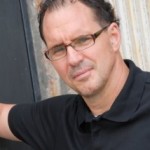 Gregory
Boyd (b. 1957) is a Yale-educated open theology advocate and senior
pastor at the mega Woodland Hills Church in St. Paul, Minneapolis. An
atheist who became a Christian in 1974, Boyd turned to open theism in
response to the many unanswered questions and objections that he saw
raised by traditional understandings of God. Explaining why God cannot
know the future, he has said, “The primary reason I hold to the open
view is that I simply can’t with integrity make sense out of a wealth of
Scripture unless I suppose that the future somewhat consists of
possibilities.” As founder of Christus Victor Ministries, he seeks to
promote this understanding of God. Two of his most influential books are
God of the Possible and Satan and the Problem of Evil.
Gregory
Boyd (b. 1957) is a Yale-educated open theology advocate and senior
pastor at the mega Woodland Hills Church in St. Paul, Minneapolis. An
atheist who became a Christian in 1974, Boyd turned to open theism in
response to the many unanswered questions and objections that he saw
raised by traditional understandings of God. Explaining why God cannot
know the future, he has said, “The primary reason I hold to the open
view is that I simply can’t with integrity make sense out of a wealth of
Scripture unless I suppose that the future somewhat consists of
possibilities.” As founder of Christus Victor Ministries, he seeks to
promote this understanding of God. Two of his most influential books are
God of the Possible and Satan and the Problem of Evil.
Reference Links:
- Letter
- Interviews (Video, 13 parts)
5. Benjamin Carson
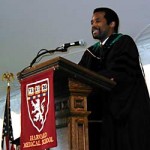 In
1987, neurosurgeon and Johns Hopkins professor Benjamin Carson (b.
1951) made medical history when he took the risk of operating on a pair
of Siamese twins (the Binder twins) joined at the back of the head.
These operations had usually failed, in previous medical experience,
resulting in the death of either or both of the twins. The operation,
led by Dr. Carson, lasted 22 hours. At the end, the twins were
successfully separated and can now survive independently. The author of
several popular books and the recipient of numerous awards and honorary
doctorates, including the Presidential Medal of Freedom, Carson is a
vigorous defender of religious values in the public square. A well known
quote by him states, “To THINK BIG and to use our talents doesn’t mean
we won’t have difficulties along the way. We will—we all do. If we
choose to see the obstacles in our path as barriers, we stop trying.”
In
1987, neurosurgeon and Johns Hopkins professor Benjamin Carson (b.
1951) made medical history when he took the risk of operating on a pair
of Siamese twins (the Binder twins) joined at the back of the head.
These operations had usually failed, in previous medical experience,
resulting in the death of either or both of the twins. The operation,
led by Dr. Carson, lasted 22 hours. At the end, the twins were
successfully separated and can now survive independently. The author of
several popular books and the recipient of numerous awards and honorary
doctorates, including the Presidential Medal of Freedom, Carson is a
vigorous defender of religious values in the public square. A well known
quote by him states, “To THINK BIG and to use our talents doesn’t mean
we won’t have difficulties along the way. We will—we all do. If we
choose to see the obstacles in our path as barriers, we stop trying.”
Reference Link:
- Interview
6. Francis Collins
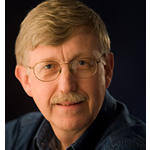 Francis
Collins (b. 1950) is a geneticist recognized for completing, on behalf
of the United States government, the map of the human genome (this
project, more than a decade in the making, was completed in April 2003).
He is best known in the popular literature for his book The Language of
God (Free Press, 2006). In that book he argues for the compatibility of
evangelical Christianity and Darwinian evolution. His thinking is
welcomed by many Christians who want science and faith to be fully
compatible. He founded Biologos, a website dedicated to faith and
science, whose main aim is to promote “theistic evolution.” When
President Barack Obama appointed him to head the National Institutes of
Health in 2009, Collins resigned his position with Biologos (though he
retains strong ties to its leadership).
Francis
Collins (b. 1950) is a geneticist recognized for completing, on behalf
of the United States government, the map of the human genome (this
project, more than a decade in the making, was completed in April 2003).
He is best known in the popular literature for his book The Language of
God (Free Press, 2006). In that book he argues for the compatibility of
evangelical Christianity and Darwinian evolution. His thinking is
welcomed by many Christians who want science and faith to be fully
compatible. He founded Biologos, a website dedicated to faith and
science, whose main aim is to promote “theistic evolution.” When
President Barack Obama appointed him to head the National Institutes of
Health in 2009, Collins resigned his position with Biologos (though he
retains strong ties to its leadership).
Reference Links:
- Genome.gov Bio
- Interviews
- Articles
7. John Dominic Crossan
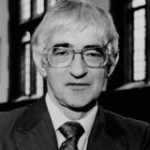 John
Dominic Crossan (b. 1934) was co-chair of the Jesus Seminar from 1985
to 1996, which at semi-annual meetings debated the historicity of the
life of Jesus as portrayed in the Gospels. Overwhelmingly, the Jesus
Seminar has concluded that the vast majority of sayings usually ascribed
to Jesus were never in fact uttered by him. Crossan has written
twenty-five books on the historical Jesus and the historical Paul, five
of which have been national religious bestsellers, including The
Historical Jesus: The Life of a Mediterranean Jewish Peasant (1991). He
has lectured worldwide to lay and scholarly audiences, and appeared in
many key media venues. His basic message is that Jesus must be
understood in historical context not as God per se but as a liberating
figure who advanced the Kingdom of God.
John
Dominic Crossan (b. 1934) was co-chair of the Jesus Seminar from 1985
to 1996, which at semi-annual meetings debated the historicity of the
life of Jesus as portrayed in the Gospels. Overwhelmingly, the Jesus
Seminar has concluded that the vast majority of sayings usually ascribed
to Jesus were never in fact uttered by him. Crossan has written
twenty-five books on the historical Jesus and the historical Paul, five
of which have been national religious bestsellers, including The
Historical Jesus: The Life of a Mediterranean Jewish Peasant (1991). He
has lectured worldwide to lay and scholarly audiences, and appeared in
many key media venues. His basic message is that Jesus must be
understood in historical context not as God per se but as a liberating
figure who advanced the Kingdom of God.
Reference Links:
- Crossan’s Homepage
- Faculty bio
- Interview 1
- Interview 2
8. Robert P. George
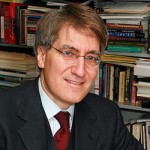 Robert
P. George (b. 1955) is Professor of Jurisprudence and Director of the
James Madison Program in American Ideals and Institutions at Princeton
University. As a conservative Roman Catholic, he encourages students to
confront contentious issues such as abortion, the death penalty, war,
and affirmative action. Currently he serves on UNESCO’s World Commission
on the Ethics of Scientific Knowledge and Technology. He is the author
of In Defense of Natural Law, Making Men Moral: Civil Liberties and
Public Morality, and The Clash of Orthodoxies: Law, Religion and
Morality in Crisis. He was the principal intellectual architect behind
the highly controversial Manhattan Declaration, which advocates civil
disobedience once the power of government infringes too directly on
Christian ethical norms.
Robert
P. George (b. 1955) is Professor of Jurisprudence and Director of the
James Madison Program in American Ideals and Institutions at Princeton
University. As a conservative Roman Catholic, he encourages students to
confront contentious issues such as abortion, the death penalty, war,
and affirmative action. Currently he serves on UNESCO’s World Commission
on the Ethics of Scientific Knowledge and Technology. He is the author
of In Defense of Natural Law, Making Men Moral: Civil Liberties and
Public Morality, and The Clash of Orthodoxies: Law, Religion and
Morality in Crisis. He was the principal intellectual architect behind
the highly controversial Manhattan Declaration, which advocates civil
disobedience once the power of government infringes too directly on
Christian ethical norms.
Reference Links:
- Faculty bio
- Interviews
9. John Hick
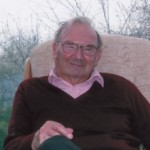 John
Hick (b. 1922) began his career teaching Christian theology at
Princeton Theological Seminary. Turning to a pluralistic conception of
faith, he has since focused on bringing religious harmony to the global
society. In his view, a deeper underlying unity underlies otherwise
divergent ideas about God. He has spoken against attempts by politicized
neuroscientists to “debunk” belief in God. Perry Schmidt-Leukel, Chair
of World Religions for Peace at the University of Glasgow, has said,
“John Hick’s search for universal truth and globally valid moral
standards is, despite some of his unorthodox conclusions, far more in
line with the intellectual thrust of the theological tradition than the
post-modern defenders of neo-‘orthodoxy’.” Hick’s work stresses the need
for dialogue across religious divides as well as the view that all
human responses to God are culturally conditioned.
John
Hick (b. 1922) began his career teaching Christian theology at
Princeton Theological Seminary. Turning to a pluralistic conception of
faith, he has since focused on bringing religious harmony to the global
society. In his view, a deeper underlying unity underlies otherwise
divergent ideas about God. He has spoken against attempts by politicized
neuroscientists to “debunk” belief in God. Perry Schmidt-Leukel, Chair
of World Religions for Peace at the University of Glasgow, has said,
“John Hick’s search for universal truth and globally valid moral
standards is, despite some of his unorthodox conclusions, far more in
line with the intellectual thrust of the theological tradition than the
post-modern defenders of neo-‘orthodoxy’.” Hick’s work stresses the need
for dialogue across religious divides as well as the view that all
human responses to God are culturally conditioned.
Reference Links:
- Faculty bio
- Interviews
10. Hans Küng
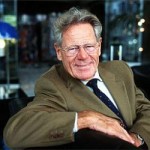 Hans
Küng (b. 1928), a Swiss Catholic priest, is known as a severe critic of
Catholic teachings on lifestyle, especially in the matter of sexual
abuse charges involving Catholic clergy. He charges the current pope of
merely “whining” about criticism and being “principally responsible for
the worldwide cover-up” and believes that Catholic culture encourages
abuse of minors. He is known for the millennial belief that “after two
world wars, the collapse of fascism, Nazism, communism and colonialism
and the end of the cold war, humanity has entered a new phase of its
history.” For many years a professor at the University of Tübingen and a
prolific author (notably of On Being a Christian and Does God Exist?),
he is inclined to view all religions as equal.
Hans
Küng (b. 1928), a Swiss Catholic priest, is known as a severe critic of
Catholic teachings on lifestyle, especially in the matter of sexual
abuse charges involving Catholic clergy. He charges the current pope of
merely “whining” about criticism and being “principally responsible for
the worldwide cover-up” and believes that Catholic culture encourages
abuse of minors. He is known for the millennial belief that “after two
world wars, the collapse of fascism, Nazism, communism and colonialism
and the end of the cold war, humanity has entered a new phase of its
history.” For many years a professor at the University of Tübingen and a
prolific author (notably of On Being a Christian and Does God Exist?),
he is inclined to view all religions as equal.
Reference Links:
- Article
Quotes
Interviews
11. Robert J. Marks II
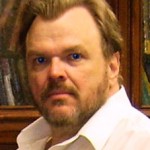 Robert
J. Marks II (b. 1950), Baylor University’s leading research professor,
has emerged as the public face of intelligent design. As the movement’s
premier scientist, he has been dubbed “the Charles Darwin of intelligent
design.” At one point, his research on intelligent design was removed
by Baylor officials from the university’s website. Since then he has
published seminal work on such themes as whether computers have minds
and whether Darwinian processes can generate biological information. He
is widely quoted as saying, “Computers are no more able to create
information than iPods are capable of creating music.” His Law of
Conservation of Information purports to demonstrate inherent limitations
on natural selection, suggesting that the intricate information needed
for life requires an intelligent source.
Robert
J. Marks II (b. 1950), Baylor University’s leading research professor,
has emerged as the public face of intelligent design. As the movement’s
premier scientist, he has been dubbed “the Charles Darwin of intelligent
design.” At one point, his research on intelligent design was removed
by Baylor officials from the university’s website. Since then he has
published seminal work on such themes as whether computers have minds
and whether Darwinian processes can generate biological information. He
is widely quoted as saying, “Computers are no more able to create
information than iPods are capable of creating music.” His Law of
Conservation of Information purports to demonstrate inherent limitations
on natural selection, suggesting that the intricate information needed
for life requires an intelligent source.
Reference Link:
- Faculty Bio
12. Michael W. McConnell
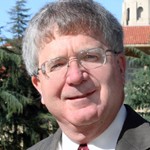 As
director of the Stanford Constitutional Law Center, Michael W.
McConnell (b. 1955) is a widely respected authority on the separation of
powers between church and state, federalism, constitutional law, as
well as originalism—the idea that the Founders’ words mean what they
say, as opposed to later creative interpretations. He is well known for
his work on freedom of religion—a critical area of constitutional law,
currently much debated. He supports a constitutional amendment banning
abortion. His center at Stanford was founded in 2006 to explore and
improve public understanding of the most pressing constitutional issues.
Before joining Stanford in 2009, McConnell served as a federal judge on
the U.S. Court of Appeals for the Tenth Circuit.
As
director of the Stanford Constitutional Law Center, Michael W.
McConnell (b. 1955) is a widely respected authority on the separation of
powers between church and state, federalism, constitutional law, as
well as originalism—the idea that the Founders’ words mean what they
say, as opposed to later creative interpretations. He is well known for
his work on freedom of religion—a critical area of constitutional law,
currently much debated. He supports a constitutional amendment banning
abortion. His center at Stanford was founded in 2006 to explore and
improve public understanding of the most pressing constitutional issues.
Before joining Stanford in 2009, McConnell served as a federal judge on
the U.S. Court of Appeals for the Tenth Circuit.
Reference Link:
- Interviews
13. R. Albert Mohler
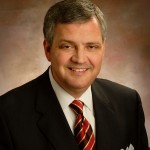 R.
Albert Mohler (b. 1959) is professor of systematic theology at The
Southern Baptist Theological Seminary in Louisville, where he serves as
its president. Mohler epitomizes the resurgence in conservative theology
that is sweeping the evangelical Christian world. The history of 20th
century Christianity showed a steady disintegration of traditional
Christian belief in the face of creeping secularization and liberalism.
Mohler’s Southern Baptist Convention was the first instance of a large
Christian denomination that had been sliding into secularity radically
moving to the right. Mohler, as leader of the Southern Baptist’s
flagship seminary, is the most visible intellectual and public face of
the New Evangelicalism.
R.
Albert Mohler (b. 1959) is professor of systematic theology at The
Southern Baptist Theological Seminary in Louisville, where he serves as
its president. Mohler epitomizes the resurgence in conservative theology
that is sweeping the evangelical Christian world. The history of 20th
century Christianity showed a steady disintegration of traditional
Christian belief in the face of creeping secularization and liberalism.
Mohler’s Southern Baptist Convention was the first instance of a large
Christian denomination that had been sliding into secularity radically
moving to the right. Mohler, as leader of the Southern Baptist’s
flagship seminary, is the most visible intellectual and public face of
the New Evangelicalism.
Reference Link
- Biography
14. Wolfhart Pannenberg
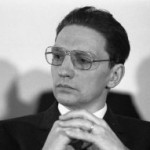 A
Lutheran, Wolfhart Pannenberg (b. 1928) learned wariness of all
ideologies when pressed into service in the last days of the Nazi Third
Reich. Rational reflection on the devastations the Nazis had wrought led
him to become a serious Christian, especially through a high school
literature teacher who was a member of the endangered Confessing Church
(the element of the Christian church that remained faithful to the
tenets of Christianity, often at ultimate cost). Pannenberg champions
the idea that faith should be based on reason and evidence. His best
known work is Jesus: God and Man in which he argues that the
Resurrection is “the ground of Jesus’ unity with God.”
A
Lutheran, Wolfhart Pannenberg (b. 1928) learned wariness of all
ideologies when pressed into service in the last days of the Nazi Third
Reich. Rational reflection on the devastations the Nazis had wrought led
him to become a serious Christian, especially through a high school
literature teacher who was a member of the endangered Confessing Church
(the element of the Christian church that remained faithful to the
tenets of Christianity, often at ultimate cost). Pannenberg champions
the idea that faith should be based on reason and evidence. His best
known work is Jesus: God and Man in which he argues that the
Resurrection is “the ground of Jesus’ unity with God.”
Reference Links:
- Papers
- Biography
- Interviews
15. Alvin Plantinga
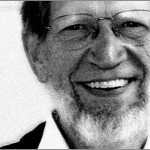 Alvin
Plantinga (b. 1932), professor of philosophy at the University of Notre
Dame, has led the way in the rational defense of Christian belief,
turning Christian philosophy into a recognized area of academic
scholarship. An expert in epistemology, metaphysics, and the philosophy
of religion, he has authored many influential books, including God and
Other Minds, The Nature of Necessity, and a trilogy on
epistemology—Warrant: The Current Debate, Warrant and Proper Function,
and Warranted Christian Belief. Coming from a Dutch reformed background,
he is a proponent of Reformed epistemology. His evolutionary argument
against naturalism has placed him at odds with atheistic Darwinists.
Alvin
Plantinga (b. 1932), professor of philosophy at the University of Notre
Dame, has led the way in the rational defense of Christian belief,
turning Christian philosophy into a recognized area of academic
scholarship. An expert in epistemology, metaphysics, and the philosophy
of religion, he has authored many influential books, including God and
Other Minds, The Nature of Necessity, and a trilogy on
epistemology—Warrant: The Current Debate, Warrant and Proper Function,
and Warranted Christian Belief. Coming from a Dutch reformed background,
he is a proponent of Reformed epistemology. His evolutionary argument
against naturalism has placed him at odds with atheistic Darwinists.
Reference Links:
- Papers & Bio
- Interviews
16. Marilynne Robinson
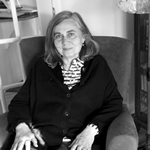 Marilynne
Robinson (b. 1943) is both a fiction and non-fiction writer. She is
author of the novel Home, which won the Orange Prize (2009) and the Los
Angeles Times Book Award. Her Gilead (Farrar, Strauss, and Giroux, 2004)
won a Pulitzer Prize. She also wrote Housekeeping (FSG, 1980), as well
as two books of nonfiction, Mother Country (FSG, 1989) and The Death of
Adam. She teaches at the University of Iowa Writers’ Workshop. An
Economist review (February 5, 2009) pointed out that “Her work always
evokes a reverence for the landscape, a grateful humility before
nature.” She has always been quite clear on the divide between the
Christian tradition and scientific reductionism.
Marilynne
Robinson (b. 1943) is both a fiction and non-fiction writer. She is
author of the novel Home, which won the Orange Prize (2009) and the Los
Angeles Times Book Award. Her Gilead (Farrar, Strauss, and Giroux, 2004)
won a Pulitzer Prize. She also wrote Housekeeping (FSG, 1980), as well
as two books of nonfiction, Mother Country (FSG, 1989) and The Death of
Adam. She teaches at the University of Iowa Writers’ Workshop. An
Economist review (February 5, 2009) pointed out that “Her work always
evokes a reverence for the landscape, a grateful humility before
nature.” She has always been quite clear on the divide between the
Christian tradition and scientific reductionism.
Reference Links:
- Essays
- Article
- Interviews
17. Rosemary Radford Ruether
 Among
the most widely regarded and readable of feminist theologians, Rosemary
Radford Ruether (b. 1936), a Roman Catholic, is the Carpenter Professor
of Feminist Theology at the Pacific School of Theology. Her book Sexism
and God-Talk is considered a classic in the field of feminist theology
and has been described as “the only systematic feminist treatment of the
Christian symbols to date.” Situating herself on the Christian left,
she has been controversial in supporting abortion rights and gay
marriage. At the same time, she sees herself as conventionally Christian
for embracing the “prophetic” rather than the “hierarchical” tradition
of the Church.
Among
the most widely regarded and readable of feminist theologians, Rosemary
Radford Ruether (b. 1936), a Roman Catholic, is the Carpenter Professor
of Feminist Theology at the Pacific School of Theology. Her book Sexism
and God-Talk is considered a classic in the field of feminist theology
and has been described as “the only systematic feminist treatment of the
Christian symbols to date.” Situating herself on the Christian left,
she has been controversial in supporting abortion rights and gay
marriage. At the same time, she sees herself as conventionally Christian
for embracing the “prophetic” rather than the “hierarchical” tradition
of the Church.
Reference Links:
- Articles
- Interviews
- Further info
18. Allan Rex Sandage
 Allan
Rex Sandage (b. 1926), a student of Edwin Hubble, is considered the
greatest living observational astronomer. He is credited with the
discovery of quasars (high energy distant galaxies) and with empirically
determining the age of the universe. After Hubble died in 1953, Sandage
continued his work. In 1965, Sandage introduced a method of identifying
quasars by using specific radio position. Sandage, who became a
Christian at age 60, has argued that “science can answer only a fixed
type of question. It is concerned with the what, when, and how. It does
not, and indeed cannot, answer within its method (powerful as that
method is) why.”
Allan
Rex Sandage (b. 1926), a student of Edwin Hubble, is considered the
greatest living observational astronomer. He is credited with the
discovery of quasars (high energy distant galaxies) and with empirically
determining the age of the universe. After Hubble died in 1953, Sandage
continued his work. In 1965, Sandage introduced a method of identifying
quasars by using specific radio position. Sandage, who became a
Christian at age 60, has argued that “science can answer only a fixed
type of question. It is concerned with the what, when, and how. It does
not, and indeed cannot, answer within its method (powerful as that
method is) why.”
Reference Links:
- Comments on religion
- Biographical Info
- Interview
19. Charles Margrave Taylor
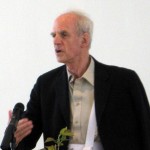 Charles
Margrave Taylor (b. 1931), professor emeritus at McGill University in
Montreal, has dedicated his career to advancing peaceful co-existence of
diverse cultures. Peaceful co-existence has been a perennial concern in
his native Canada, as with its threatened breakup in 1976 when a
separatist party became the government of Quebec. As a philosopher and
political theorist, Taylor’s scope is global. His best known book is
Sources of Self, in which he traces the disintegration in western
culture of theistically grounded morality. Taylor has received many
honors and awards for his work, including the Templeton Prize for
Progress in Religion.
Charles
Margrave Taylor (b. 1931), professor emeritus at McGill University in
Montreal, has dedicated his career to advancing peaceful co-existence of
diverse cultures. Peaceful co-existence has been a perennial concern in
his native Canada, as with its threatened breakup in 1976 when a
separatist party became the government of Quebec. As a philosopher and
political theorist, Taylor’s scope is global. His best known book is
Sources of Self, in which he traces the disintegration in western
culture of theistically grounded morality. Taylor has received many
honors and awards for his work, including the Templeton Prize for
Progress in Religion.
Reference Links:
- Biography
- Interviews
20. N. T. Wright
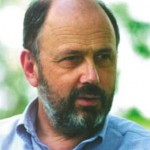 Nicholas
Thomas Wright (b. 1948), widely known as “Tom” or “N.T.,” is the former
Anglican bishop of Durham and presently a research professor at the
University of St. Andrews in Scotland. He is a preeminent New Testament
scholar, best known for his works defending orthodox Christian belief.
His book The Resurrection of the Son of God was so influential that even
Antony Flew, the late atheist scholar turned deist, praised it in his
own book There IS a God (2007). Wright has defended his practice of
writing “god” with a small “g” explaining that “in the first century, as
well as the twenty-first, the question is not whether we believe in god
… but which out of many available candidates we might be talking
about.”
Nicholas
Thomas Wright (b. 1948), widely known as “Tom” or “N.T.,” is the former
Anglican bishop of Durham and presently a research professor at the
University of St. Andrews in Scotland. He is a preeminent New Testament
scholar, best known for his works defending orthodox Christian belief.
His book The Resurrection of the Son of God was so influential that even
Antony Flew, the late atheist scholar turned deist, praised it in his
own book There IS a God (2007). Wright has defended his practice of
writing “god” with a small “g” explaining that “in the first century, as
well as the twenty-first, the question is not whether we believe in god
… but which out of many available candidates we might be talking
about.”
Reference Links:
- Online works
- Interviews
- Quote